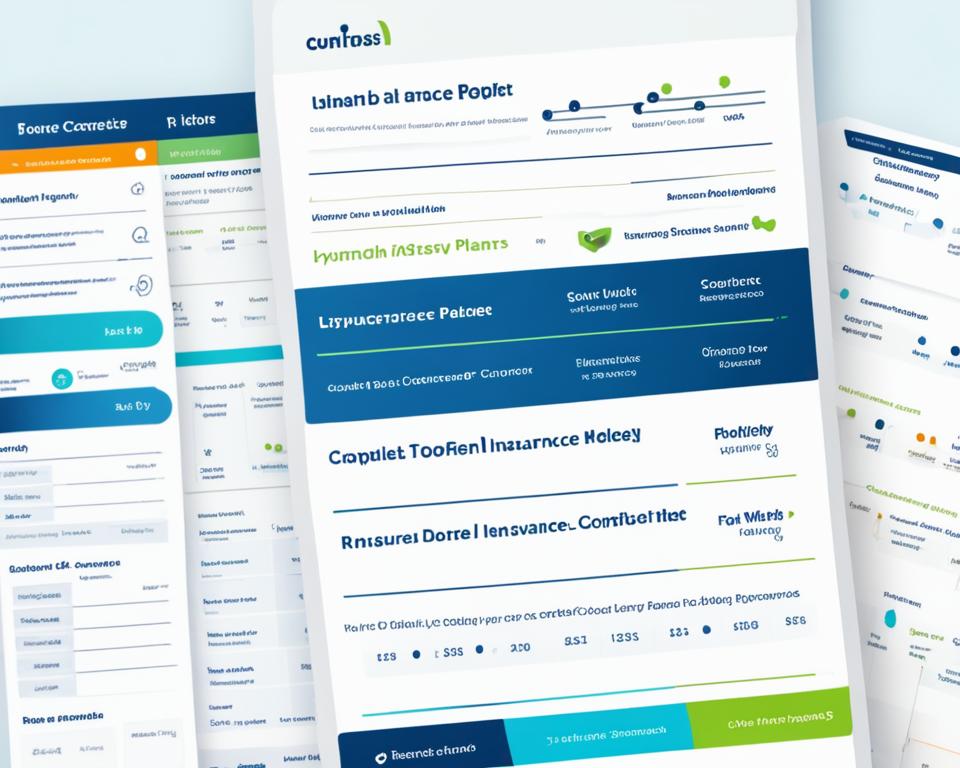When it comes to selecting an insurance plan, it’s important to choose one that suits your needs and provides adequate coverage. With the wide range of options available, it can be overwhelming to make a decision. However, by comparing different insurance plans and considering factors such as cost, coverage, and benefits, you can find the best insurance option for you. Taking the time to assess your needs and research various insurance providers will help you make an informed decision and ensure you have affordable insurance coverage.
Key Takeaways:
- Consider your specific insurance needs and research various insurance providers to find the best option.
- Compare the cost, coverage, and benefits offered by different insurance plans.
- Assess the reputation, financial stability, and customer reviews of insurance providers.
- Pay attention to policy details such as premiums, deductibles, and limitations.
- Utilize online tools and resources to compare insurance policies and get quotes from different providers.
Factors to Consider When Choosing an Insurance Plan
When it comes to selecting an insurance plan, there are several important factors to consider. By evaluating these factors, you can make an informed decision and select the right insurance plan for your needs. Here are some key considerations:
Evaluate the Reputation and Financial Stability
One crucial factor is the reputation and financial stability of the insurance providers you’re considering. Look for top insurance providers who have a strong track record and positive customer reviews. Choosing a reputable insurance provider ensures that you’ll receive reliable coverage and excellent customer service when you need it.
Assess Coverage and Benefits
Another essential factor to consider is the coverage and benefits offered by each insurance plan. Identify your specific needs, whether it’s health, auto, home, or life insurance, and ensure that the plan adequately covers those needs. Review the policy’s details to understand what is covered and what is not, as well as any additional benefits provided. This will help you determine if the plan aligns with your requirements.
Consider the Cost and Financial Obligations
Cost is a significant consideration when selecting an insurance plan. Take into account the cost of premiums, deductibles, and copayments associated with each plan. Assess your budget and determine what you can afford without compromising coverage. Additionally, be aware of any restrictions or limitations in the policy that may impact your financial obligations.
Compare Plans to Find the Right Fit
It’s crucial to compare different insurance plans to find the right fit for your needs. Utilize online resources, such as insurance comparison tools, to receive quotes from various providers and compare costs. Consider factors such as coverage limits, exclusions, and any restrictions that may apply to each plan. By comparing plans, you can identify the one that offers the best coverage and value for your specific requirements.

How to Compare Insurance Plans
Comparing insurance plans is essential when it comes to choosing the best policy for your needs. To make an informed decision, follow these steps:
- Use an Insurance Comparison Tool: Start by utilizing an insurance comparison tool to obtain quotes from different providers. This tool allows you to compare costs and identify any variations in coverage. The Insurance comparison tool is a useful resource that saves time and helps you make an informed choice.
- Review Policy Documents: Carefully review the policy documents of each plan you are considering. Take the time to understand the terms and conditions, including coverage limits, exclusions, and any restrictions that may apply. This ensures that you have a clear understanding of what each insurance policy entails.
- Consider Reputation and Customer Service: Take into account the reputation and customer service of each insurance provider. Research customer reviews and ratings to get an idea of their track record in handling claims. A reliable and customer-centric insurance provider is crucial for a smooth insurance experience.
- Consult with an Insurance Agent or Broker: Seek guidance from an insurance agent or broker who can provide expert advice tailored to your specific needs. They can help you navigate through the different options, explain complex terms, and recommend the best insurance policy that offers the right coverage at an affordable price.
By using an insurance comparison tool, reviewing policy documents, considering the reputation of insurance providers, and consulting with professionals in the industry, you can make an informed decision and choose the best insurance policy for your specific requirements.
Image:

Conclusion
Choosing the right insurance plan is a critical decision that requires careful consideration. By following the steps outlined in this insurance decision-making guide, you can navigate the complexities of selecting an insurance plan and find one that provides optimal coverage and value.
Firstly, assess your needs and determine the type of insurance you require, such as health, auto, home, or life insurance. Consider factors like your budget, lifestyle, and specific coverage requirements.
Next, compare different insurance plans from reputable providers. Utilize online tools and resources that allow you to easily compare costs, coverage, and benefits. Take the time to review policy documents and understand the terms and conditions associated with each plan.
Lastly, seek guidance from professionals in the insurance industry, such as insurance agents or brokers. Their expertise can provide personalized advice and help you navigate the decision-making process.
By following these steps and being diligent in your research, you can make an informed decision and select an insurance plan that meets your specific needs. Remember, insurance is an important safeguard that provides peace of mind, so take the time to choose wisely.
FAQ
What factors should I consider when choosing an insurance plan?
When choosing an insurance plan, you should consider factors such as the reputation and financial stability of the insurance providers, the coverage and benefits offered, the cost of premiums, deductibles, and copayments, as well as any restrictions or limitations in the policy.
How can I compare different insurance plans?
To compare insurance plans, you can use an insurance comparison tool to get quotes from different providers. Additionally, carefully review the policy documents and understand the terms and conditions of each plan. Consider coverage limits, exclusions, restrictions, and the reputation and customer service of each insurance provider.
What is the best way to choose the right insurance plan for me?
To choose the right insurance plan, you should assess your specific needs, compare different insurance plans, and consider factors such as cost, coverage, and benefits. Utilize online tools and resources to compare insurance policies. Additionally, consult with professionals in the insurance industry who can provide personalized guidance.





